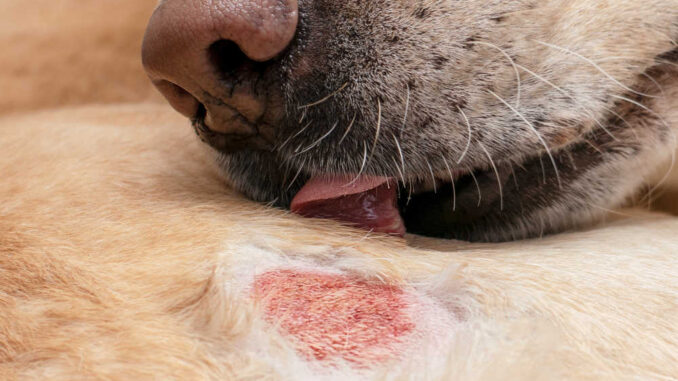Quick Tips: How to Help a Dog With Skin Allergies?

Allergies can be the most miserable! The sniffing, the sneezing, the congestion of the nose…But in contrast to your allergic reactions your dog’s allergies don’t typically cause the same symptoms that you have. In most cases, when dogs suffer from allergies, their skin reacts to allergens and becomes itchy and affected. This can lead to many other problems for your dog. Would you like to find your dogs some cute dog names? Here’s where you can find what you’re looking for. It will help you to find the right dog name if you use this online dog name generator.
What Are Dogs Skin Allergies?

The most commonly reported dog skin allergies are allergic dermatitis or atopic dermatitis, also known as atopy for short. Allergic dermatitis can be described as an inflammatory chronic skin condition that manifests when the immune system of a dog reacts too strongly to a specific allergen.
Allergens can range from pollens of plants to mold spores, food items to insects. Human allergies typically manifest as nasal symptoms and itchy hives in dogs, they can respond to skin irritations, and even digestive issues.
It is interesting to note that many dogs who are afflicted by skin allergies have an inherent predisposition to develop allergies. Most dogs show signs of skin allergies prior to 7 years of age, but that’s not a definitive rule. As with humans, dogs may suffer from skin allergies at any time. Actually, many allergies tend to get worse as the dog ages.
What Dog Breeds are Prone to Dog Skin Allergies?

There are a variety of dog breeds that are susceptible to skin allergies. Certain breeds that are more prone to skin allergies are Beagles, Bulldogs, Dalmatians, English and Irish Setters, Golden Retrievers, Labradoodles and Goldendoodles, Labrador Retrievers, Lhasa Apsos, Miniature Schnauzers, and most terriers. They also include Old English Sheepdogs and pugs.
This list is not by not exhaustive and does not guarantee that the breeds that are listed will or won’t suffer from skin allergies. It’s merely a listed breed that is predisposed to Atopic dermatitis.
What Are the Most Common Dog Allergies?
Three major causes of dog skin allergies:
-
Environmental Allergies.
Allergens that are found in the environment are dust pollen, mold, and dust. As with humans, dogs are susceptible to seasonal and environmental allergies. Your dog could have “hot spots” or “itchy spots” when certain allergies are in the air. These triggers can happen at specific times of the year or all through the year.
-
Food-Related Allergies.
Dogs may also react badly to certain foods or ingredients within the food. Although a dog might experience reactions to the skin a second issue can occur that is more digestive. It is important to be aware that proteins are the main cause of the majority of food allergies.
-
Flea Allergy Dermatitis.
Infections with fleas cause dermatology. The majority of dogs aren’t allergic to the flea, but to the proteins present in saliva from the flea. An interesting fact is that a single bite by a flea can cause an allergic reaction that lasts at least seven days! This means that even a single flea bite can cause a great deal of harm.
What are Common Symptoms of Dog Skin Allergies?
How can you tell what to look for if your pet is suffering from allergies? Common signs include:
- Excessive Licking
- Face rubbing
- Swelling or hives that are targeted, especially around the areas around the eyes, ear or flaps of the ear and on the face
- Itchiness
- Loss of fur
- Skin that is red, itchy, and irritated
How Do You Treat Dog Skin Allergies?
If you want to help your pet feel better it is important to identify the source that triggers the allergy. For instance, while creams for anti-itching that are applied to the skin may provide some relief from red and itchy areas, they aren’t an all-time solution. The maintenance of a dog’s skin requires that you avoid irritating allergens entirely.
-
Food Allergies
Allergies to food can be difficult to determine. The best way to deal with it is to avoid certain food items or alter the dog’s diet to determine what triggers an allergic reaction. Remember that even premium dog food could contain ingredients that cause an allergic reaction in the dog. Before you begin putting your pet on an elimination diet, talk with your veterinarian. It is important to ensure that your dog is getting the nutrition it requires while in the process of discovering.
-
Environmental Allergies
Although it is easier to spot Environmental allergies are more difficult to prevent. For instance, if you find that your pet suffers from allergies to pollen, and you live in a rural area it could be that there are many triggers to completely avoid. Talk about a treatment plan with your veterinarian to provide your dog with relief. Your vet may recommend antihistamines or other methods to combat environmental allergens.
-
Flea Allergies
Treatment of flea allergies focuses more on prevention than relief. Prevention of ticks and fleas is essential as the most effective method to manage an allergy is to eliminate the allergen. For instance, Adams Flea & Tick Collar for Dogs & Puppies eliminates adult ticks and fleas and can even deter mosquitoes*. These little pests can cause significant injuries to the skin of dogs therefore it’s essential to be on the lookout for them. Also, Adams Plus Flea and Tick Prevention Spot On for Dogs is a different solution to keep tiny bugs from causing damage.
The prevention of fleas doesn’t stop at protecting your pet. It’s also crucial to safeguard your yard and home from insects that hunt your pet. Adams Flea and Tick Spray for Home is vital in killing adult fleas the eggs of fleas, larvae of fleas as well as beetles, ticks mosquitoes, and other irritating insects. The spray is useful because it works on just about everything your pet touches such as carpets, upholstery, bedding, and many others. Additionally, Adams Yard & Garden Spray can be used to eliminate more than 60 types of bugs. This is prevention on steroids! The advantage of pest control is that it safeguards everyone in the family, not just your dog.
Do you need to test for allergies in dogs?
You don’t need to guess what your dog might be intolerant to. Allergy testing is offered for pet owners. It’s however just as difficult and costly for animals just like for us. If you’ve ever been subjected to allergy tests you’ll know that it’s not an easy walk in the park and therefore, it’s not the most suitable option for your pet’s favorite animal.
While environmental and seasonal allergy tests are readily available but they’re not always reliable. Some studies have revealed that skin and blood testing for food allergies isn’t always reliable for dogs. It’s therefore essential to discuss the options with your veterinarian. They’re currently on the latest information and can assist you in identifying the allergen that is affecting your pet.
What can I do to assist my dog now?
If you’re looking to offer your furry friend some needed relief, you could consider offering him a thorough bath and grooming session that is designed to relax the skin. Thorough brushing can help get rid of dandruff and unwanted dander. It also can help remove allergens that are in your pet’s fur. If you’re bathing your dog, make sure to pick a shampoo that can repel unwanted pests and also calm your dog’s skin that is irritated. Adams Plus Flea and Tick Shampoo with Precor is an excellent choice since it’s loaded with gentle aloe, oatmeal coconut extract, and Lanolin.
As a pet owner, you are responsible to ensure that you avoid any harm whenever it’s possible, and therefore, prevention measures are paramount.5 Make sure to prevent and control the things you can. Also, be aware that allergies to the skin of dogs are quite frequent. It’s true that you cannot bubble wrap your pet’s fur however, you can do your best to keep him content and healthy by eliminating potential allergens whenever possible.
The management of a dog suffering from allergic skin conditions can prove a challenge and can be frustrating for you and your dog. Remember that in the majority of instances, allergic dermatitis is treated with the proper diagnosis. Therefore, talk to your doctor and figure out a treatment strategy that will work best.



